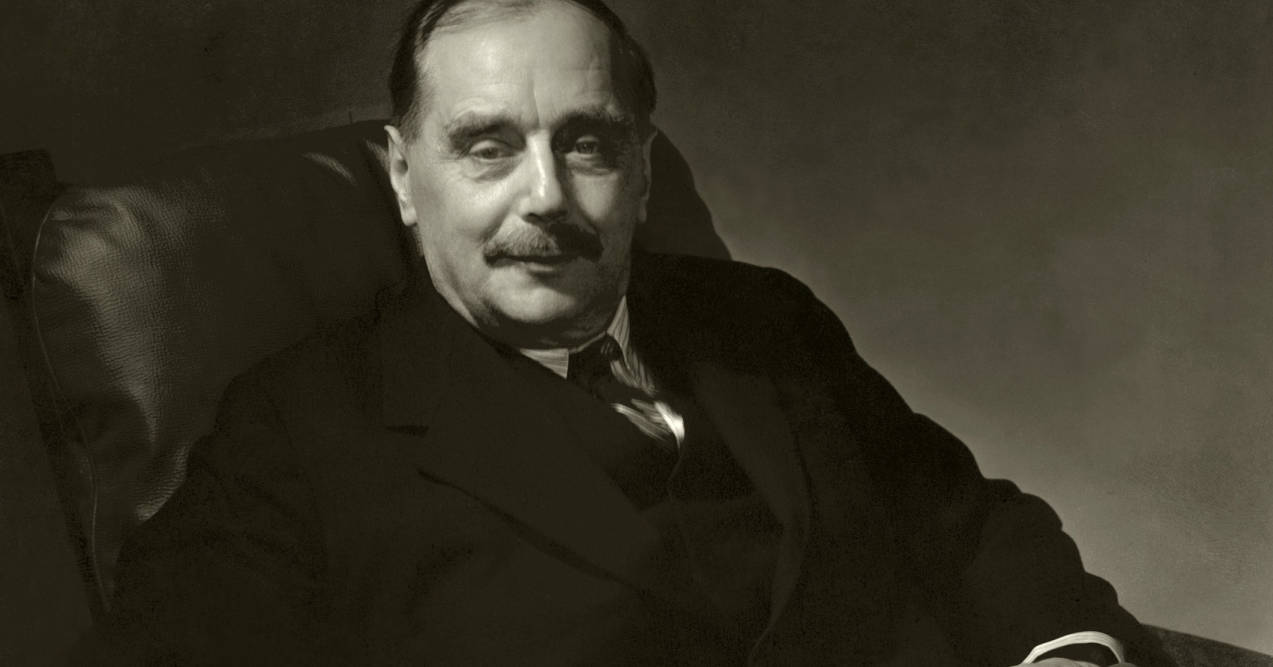“Forthwith flashes of actual flame, a bright glare leaping from one to another, sprang from the scattered group of men. It was as if some invisible jet impinged upon them and flashed into white flame. It was as if each man were suddenly and momentarily turned to fire.
Then, by the light of their own destruction, I saw them staggering and falling, and their supporters turning to run.
I stood staring, not as yet realising that this was death leaping from man to man in that little distant crowd. All I felt was that it was something very strange. An almost noiseless and blinding flash of light, and a man fell headlong and lay still; and as the unseen shaft of heat passed over them, pine trees burst into fire, and every dry furze bush became with one dull thud a mass of flames. And far away towards Knaphill I saw the flashes of trees and hedges and wooden buildings suddenly set alight.
It was sweeping round swiftly and steadily, this flaming death, this invisible, inevitable sword of heat. I perceived it coming towards me by the flashing bushes it touched, and was too astounded and stupefied to stir. I heard the crackle of fire in the sand pits and the sudden squeal of a horse that was as suddenly stilled. Then it was as if an invisible yet intensely heated finger were drawn through the heather between me and the Martians, and all along a curving line beyond the sand pits the dark ground smoked and crackled. Something fell with a crash far away to the left where the road from Woking station opens out on the common. Forth-with the hissing and humming ceased, and the black, dome-like object sank slowly out of sight into the pit.
All this had happened with such swiftness that I had stood motionless, dumbfounded and dazzled by the flashes of light. Had that death swept through a full circle, it must inevitably have slain me in my surprise. But it passed and spared me, and left the night about me suddenly dark and unfamiliar.
The undulating common seemed now dark almost to blackness, except where its roadways lay grey and pale under the deep blue sky of the early night. It was dark, and suddenly void of men. Overhead the stars were mustering, and in the west the sky was still a pale, bright, almost greenish blue. The tops of the pine trees and the roofs of Horsell came out sharp and black against the western afterglow. The Martians and their appliances were altogether invisible, save for that thin mast upon which their restless mirror wobbled. Patches of bush and isolated trees here and there smoked and glowed still, and the houses towards Woking station were sending up spires of flame into the stillness of the evening air.
Nothing was changed save for that and a terrible astonishment. The little group of black specks with the flag of white had been swept out of existence, and the stillness of the evening, so it seemed to me, had scarcely been broken.
It came to me that I was upon this dark common, helpless, unprotected, and alone. Suddenly, like a thing falling upon me from without, came–fear.
With an effort I turned and began a stumbling run through the heather.
The fear I felt was no rational fear, but a panic terror not only of the Martians, but of the dusk and stillness all about me. Such an extraordinary effect in unmanning me it had that I ran weeping silently as a child might do. Once I had turned, I did not dare to look back.
I remember I felt an extraordinary persuasion that I was being played with, that presently, when I was upon the very verge of safety, this mysterious death–as swift as the passage of light–would leap after me from the pit about the cylinder and strike me down.” – H.G Wells, The War of The Worlds











Suggestion for some future Quote of the Day (from a confessed and unabashed Heinlein addict):
“The instinct to survive is human nature itself, and every aspect of our personalities derives from it. Anything that conflicts with the survival instinct acts sooner or later to eliminate the individual and thereby fails to show up in future generations. . . . A scientifically verifiable theory of morals must be rooted in the individual’s instinct to survive–and nowhere else!–and must correctly describe the hierarchy of survival, note the motivations at each level, and resolve all conflicts.
We have such a theory now; we can solve any moral problem, on any level. Self-interest, love of family, duty to country, responsibility toward the human race . . . .
The basis of all morality is duty, a concept with the same relation to group that self-interest has to individual.”
― Robert A. Heinlein, Starship Troopers
Lest we forget just how puny we are in this great cosmos. It still don’t take much to push us over. There are things out there, terrific and horrible, and real, that can eliminate us in our entirety in the wink of an eye.
But for the grace of God, there go I…
“You are about to move into areas of the galaxy containing wonders more incredible than you can possibly imagine – and terrors to freeze your soul…If you can’t take a little bloody nose, maybe you ought to go back home and crawl under your bed. It’s not safe out here. It’s wondrous, with treasures to satiate desires both subtle and gross. But it’s not for the timid.”
–“Q” on the nature of the Universe.
Maurice Hurley in Star Trek The Next Generation